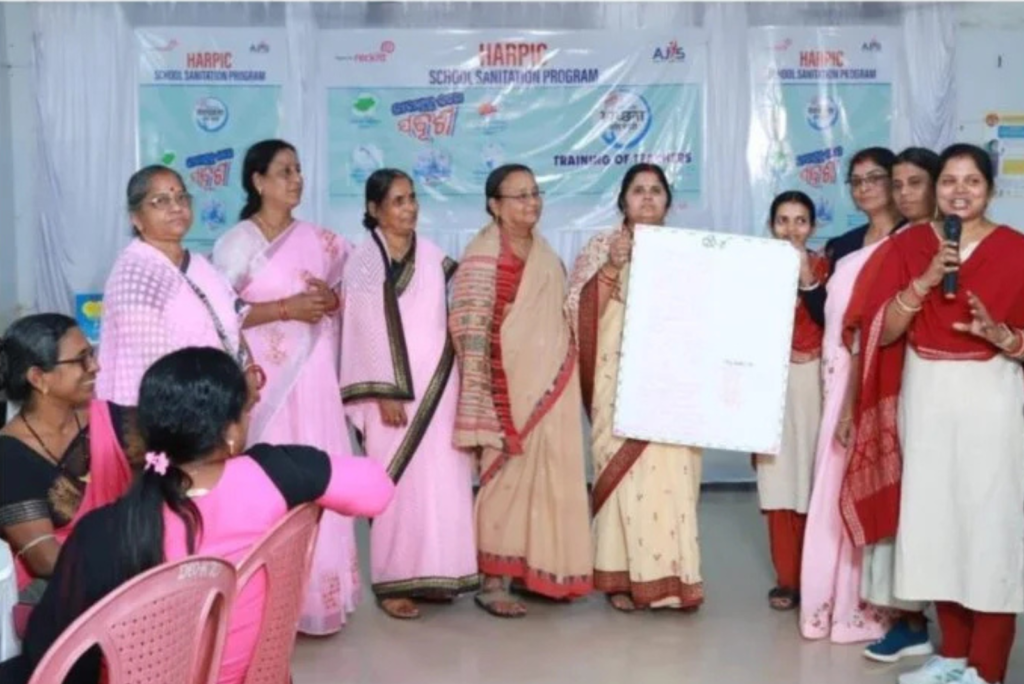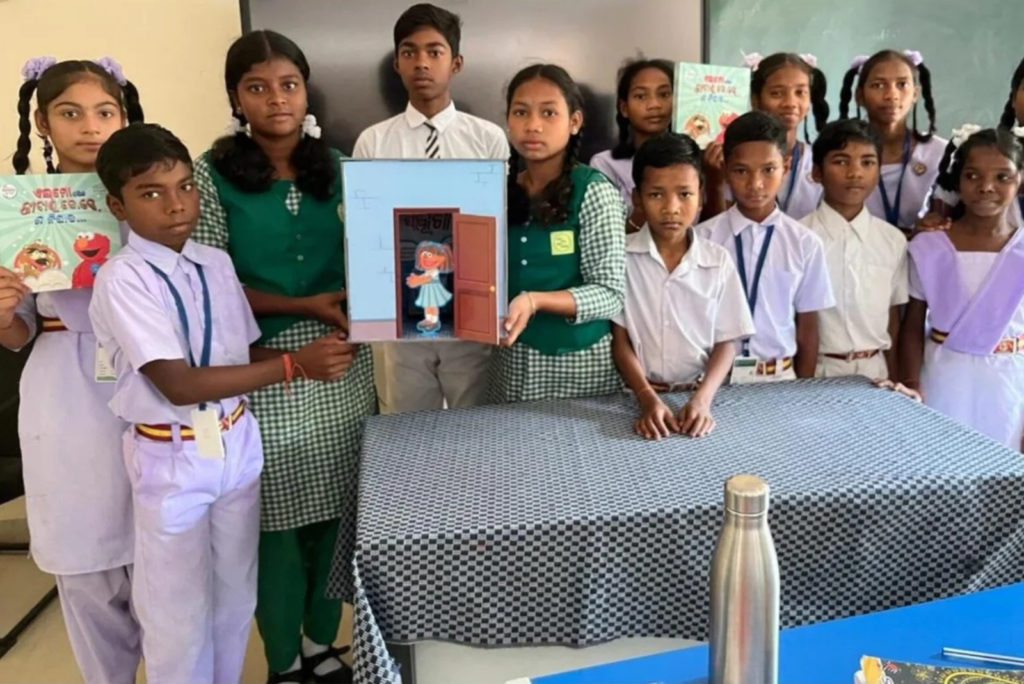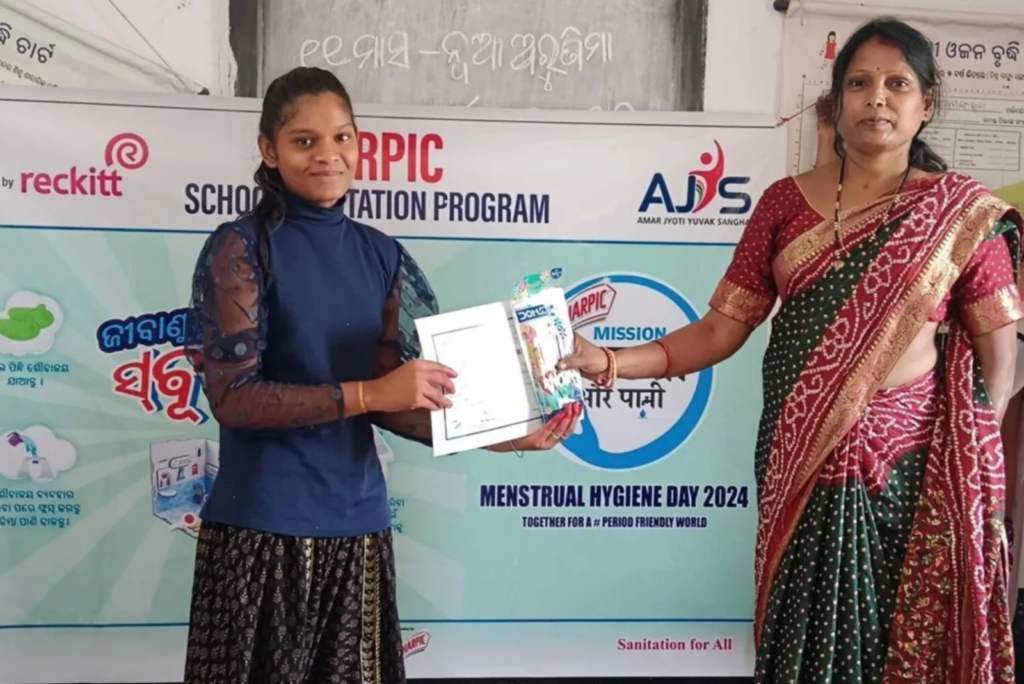In the district of Khordha, Odisha, the winds of change were blowing through the halls of its schools. The Harpic School Sanitation Program, brought to life by the dedicated WASH NGO AJ FOUNDATION, was set to transform not just the infrastructure but the very fabric of school life. The collaborative spirit of teachers and students is visible in working hand-in-hand to design and implement a dynamic Information, Education, and Communication (IEC) strategy.
The Seed of Change
It all began on a bright morning at Saraswati Vidya Mandir, one of the many schools in Khordha. Principal Mishra had gathered his staff for an important announcement. With a sense of excitement, he unveiled the new sanitation initiative supported by Harpic and AJ FOUNDATION. The goal was clear: to revolutionize the school’s sanitation facilities and foster a culture of cleanliness.Mrs. Rani, a passionate science teacher, immediately saw the potential. She knew that for real change to happen, students needed to feel a sense of ownership over their environment. She proposed forming a team of dedicated teachers and students to lead the initiative, blending education with action.
Building the Sanitation Squad
A week later, the Sanitation Squad was born. Comprising teachers like Mrs. Rani and a group of enthusiastic students, the squad was tasked with designing the IEC activities that would breathe life into the program. Their mission: to make sanitation education engaging, practical, and impactful.
They started with brainstorming sessions, where ideas flowed freely. The students suggested activities that would resonate with their peers – from hygiene-themed art competitions to catchy handwashing jingles. The teachers, with their experience, structured these ideas into a cohesive plan.

Learning by Doing
The first major event was a school-wide workshop on the importance of sanitation. Unlike traditional lectures, this workshop was interactive. The students created posters and skits that highlighted key hygiene practices. One memorable skit featured a mischievous character named “Germy” who caused chaos until students taught him proper hygiene habits.
The workshop was a hit. Laughter and learning filled the auditorium as students performed and engaged with the material. The impact was immediate – handwashing stations saw increased use, and students began reminding each other about cleanliness.
Hygiene Heroes in Action
To maintain momentum, the Sanitation Squad launched the “Hygiene Heroes” campaign. Every month, classes competed for the title of “Hygiene Hero,” awarded to the class that best maintained cleanliness. The winning class enjoyed privileges like extra playtime and a certificate of recognition.
Teachers integrated sanitation topics into their lessons. In science class, Mrs. Rani conducted experiments showing the effects of germs. In art, students created posters promoting hygiene. Even in literature, stories about cleanliness and health were discussed.
Creating Ripples Beyond School
The enthusiasm of the students spilled over into their homes and communities. They proudly shared their new knowledge with their families, teaching younger siblings and even neighbors about the importance of sanitation. Parents began to notice changes – children insisting on handwashing before meals and taking care of their surroundings.
Former students, now community members, also joined the cause. Inspired by the changes in their old school, they volunteered time and resources. Local businesses chipped in, providing cleaning supplies and sponsoring community clean-up events.

A Lasting Legacy
The Harpic School Sanitation Program, through the efforts of AJ FOUNDATION and the collaborative spirit of Khordha’s teachers and students, created a lasting impact. The Sanitation Squad became a permanent fixture, continuing to innovate and inspire. Hygiene Heroes became role models, their habits shaping a cleaner, healthier future for Khordha.
The success of the program was evident in the behavior changes – not just in the students, but across the entire community. A sense of pride and ownership blossomed, proving that when educators and students join forces, they can achieve extraordinary things.
And so, in the district of Khordha, a clean revolution took root. It wasn’t just about toilets and handwashing stations; it was about a community united in the pursuit of health, dignity, and a brighter tomorrow.
From the creative story of the Harpic School Sanitation Program in Khordha District, Odisha, several important lessons can be gleaned:
- Empowerment through Collaboration: The story highlights the power of collaboration between teachers, students, NGOs, and the broader community. By working together towards a common goal, they were able to achieve far greater impact than any individual effort could have.
- Ownership Drives Change: The sense of ownership instilled in both teachers and students was crucial to the program’s success. When individuals feel a personal stake in a project, they are more motivated to actively participate and drive positive change.
- Engagement Breeds Results: The program’s emphasis on engaging students through interactive and practical activities proved highly effective.

By making sanitation education enjoyable and relevant, they were able to capture the attention and participation of students, leading to meaningful behavior change.
- Sustainability Requires Integration: Integrating sanitation education into the school curriculum ensured that it became a natural part of students’ learning experience. By embedding these lessons across various subjects and activities, the program laid the groundwork for long-term behavior change.
- Community Involvement is Key: The ripple effect of the program extended beyond the school gates, reaching families, former students, local businesses, and the wider community. This demonstrates the importance of engaging all stakeholders in sanitation initiatives to create a truly comprehensive and sustainable impact.
- Celebrating Progress Encourages Continuity: Recognizing and celebrating achievements, such as the “Hygiene Heroes” campaign, helped maintain momentum and motivation. By reinforcing positive behaviors and providing incentives, the program fostered a culture of continuous improvement and participation.
Overall, the story of the Harpic School Sanitation Program in Khordha District underscores the importance of holistic, community-driven approaches to sanitation initiatives. By leveraging collaboration, ownership, engagement, and integration, similar programs can replicate and build upon its success in promoting hygiene and sanitation behavior change.
